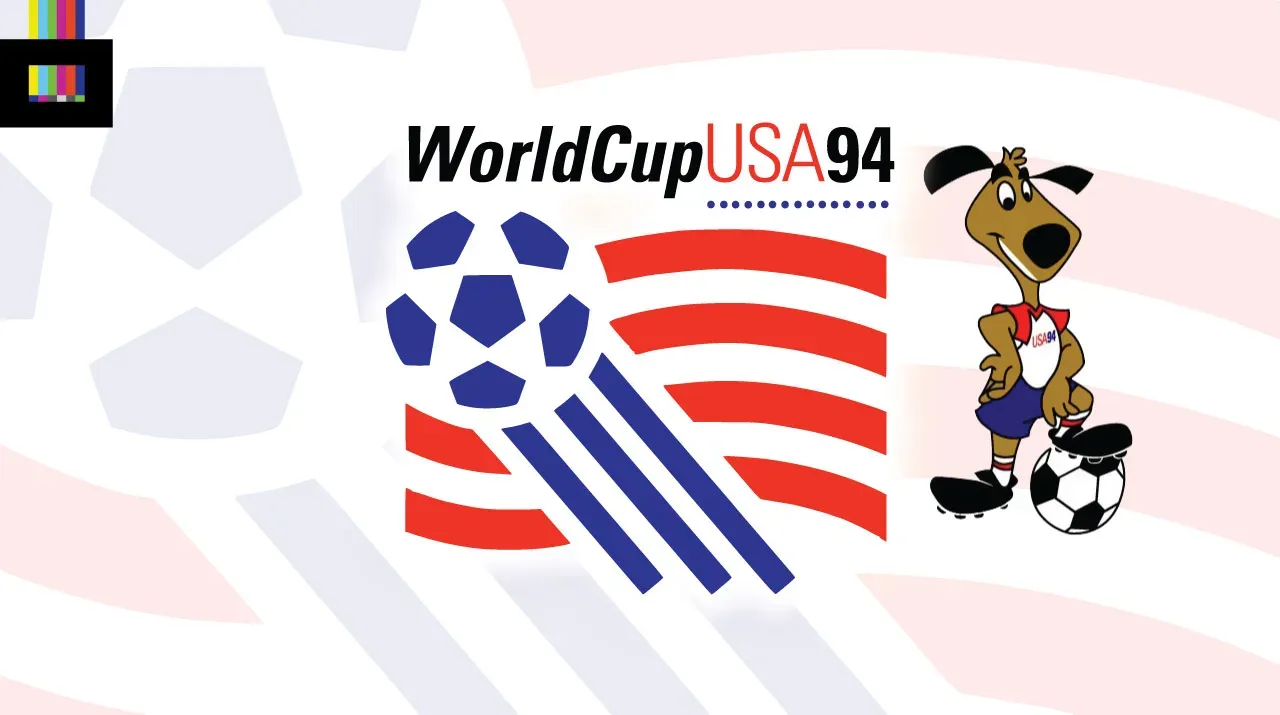The United States first broke into the global soccer consciousness when it hosted World Cup 94. The tournament was the most financially successful in history, and still holds the records for highest total and average attendance – despite subsequent tournaments having more teams and more games.
But the visuals of the tournament stand out as well. The massive crowds at sold-out NFL stadiums. The baggy, iconic kits including the USA’s infamous “denim” tops. The return of a unified Germany side. Brazil lifting their fourth World Cup trophy.
And then there’s the logo and mascot. Despite it being the biggest event for the world’s game, these two elements carried a distinctively American flare. With the 2026 World Cup coming back to the US, and the logo and surrounding branding is to be unveiled Wednesday, it’s a good time to take a look back at the classic 1994 designs.

The Logo
The World Cup 94 logo is simple, but it’s still a great design. The ball streaking across the red and white stripes to form the union on the canton of the simplified USA flag is genius. It tells you everything you needed to know about the event – soccer in the USA, in the biggest way the country had ever seen the sport. From a purely technical standpoint, it’s a strong design too. Reproduction at small sizes is always important to consider. While the text and small dots underneath it are problematic, the flag icon itself works wonderfully at any size – on a hat, a small t-shirt tag, or on the side of a building. And it’s only three colors (four if you count the white it was usually displayed on). Easy to produce, and it passes the “a kid could reasonably doodle this from memory” test.
The design is very reminiscent of the longtime official US Soccer Logo. The Federation introduced a similar streaking ball design (only going to the right instead of the left) in the early 1990s. The core of that design would remain a part of the USSF visual identity until 2016.
The flag design is a little dated now, sure, but it was perfect for its time and for the tournament.
The Mascot
There have been some odd World Cup mascots over the years. We had Ciao the Italian stick figure, Pique the jalapeño, and most recently, La’eeb the anthropomorphic ghutra – a type of headdress worn in Qatar.
But, especially as a soccer fan who grew up in Fort Lauderdale, I’ve always been partial to 1994’s Striker, “The World Cup Pup.”
Though Striker was designed by the animation team at Warner Bros, the character had more of a classic Hanna-Barbera feel. He was a little like Huckleberry Hound, except not blue and a soccer player.
Having a mascot that looked like he jumped right out of a TV screen from a Saturday morning cartoon perfectly fit the ethos of the event.
Looking ahead to 2026
World Cup 2026 will be here before we know it. And with the new, expanded World Cup will come a new visual identity that will be forever burned into the minds of soccer fans everywhere.
While the USA is the centerpiece of the next World Cup, Mexico and Canada will also be sharing hosting duties. In addition to the multi-national nature of the event, the USA has greatly changed as a soccer nation since 1994.
We now have a robust professional setup, with five fully professional men’s leagues. The US also has the one of the world’s top women’s pro leagues, with two more pro lower divisions on the way. In 1994, there was only one fledgling second division professional league.
Plus, US fans have become far greater connoisseurs of the sport. Most leagues from around the world are easily available on TV and streaming, and overseas competitions and clubs are wildly popular.
So we shouldn’t expect a repeat of the 1994, Uncle Sam-esque stars and stripes theming for the competition.
The logo will likely feature a more international style, or even something not specifically evoking any country at all. But I will predict that there will be three separate mascot characters introduced, one for each of the hosts in a style that fits each nation. It wouldn’t be the first World Cup with multiple mascots, and it makes sense given it’s the first ever tournament spread across three nations.
Here’s hoping the folks in charge of these things come up with a stellar logo design and some fun mascots. At the end of the day, it’s the games that really matter. But good branding will get what should be another record-breaking tournament off on the right foot.
